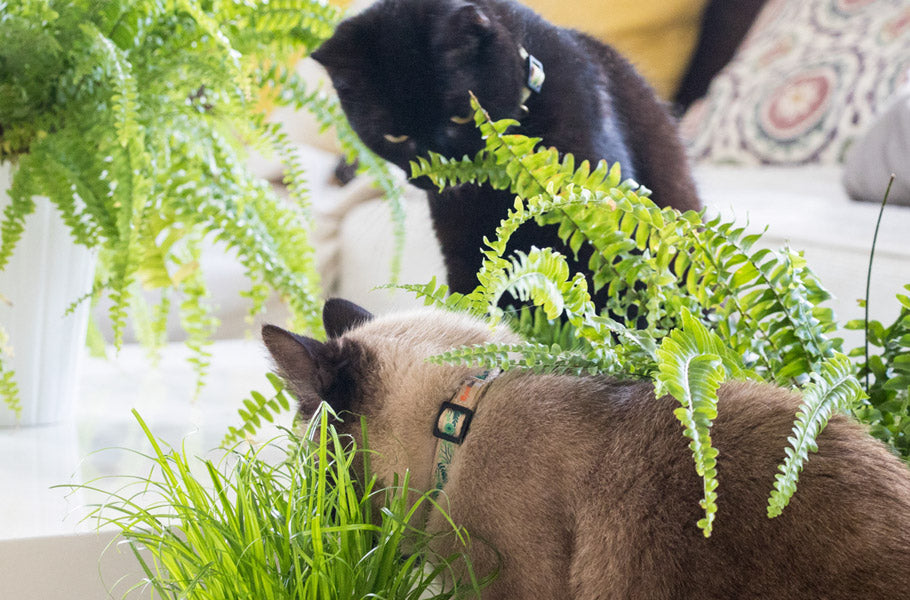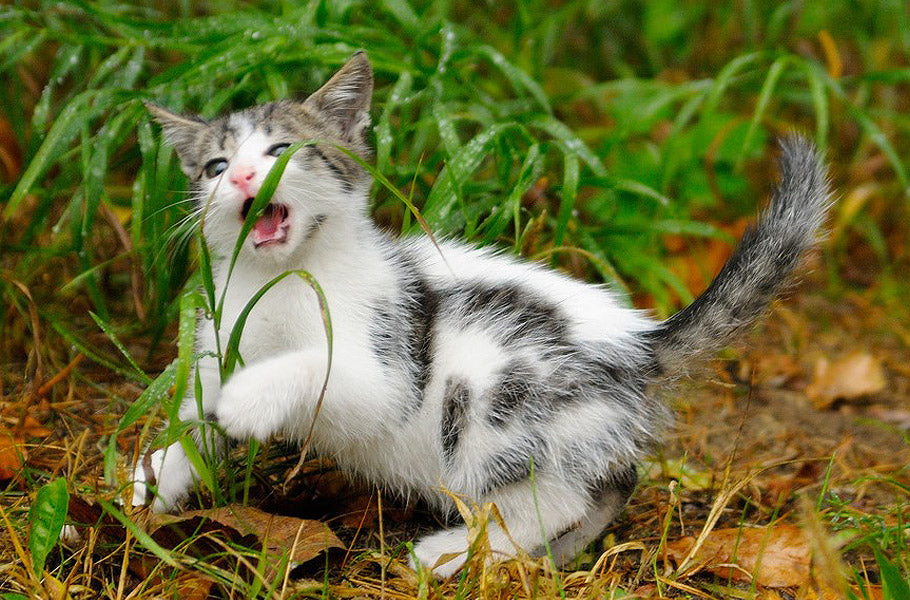You might have noticed your cat eating lots of grass and wonder why they do so. Well, this is one of the weird things that cats do and scientists have been deeply concerned to know why. Several studies have been conducted, but there’s still no single reason why cats may choose to supplement their diet with grass.
However, there’s a myth that cats eat grass to induce vomiting when they have a stomach upset. But this may not necessarily be true. If cats vomit every time they eat grass, it would be concerning; If it does this frequently, then you should visit your vet. But if your cat eats grass without vomiting, then it becomes a major issue.

Why do felines eat grass?
Researchers conducted a study on over 1000 cat owners who spent at least 3 hours hanging out with their cat every day. Many owners suspected that eating grass is a common behavior. About 71% of the cats were caught at least 6 times eating grass in their lifetime, and only 11% were never seen to feed on grass.
More so, 91% of the respondents reported that their cat did not show any sign of sickness before gobbling grass. Only about a quarter of the grass eaters were observed to vomit afterward.
The vomiting occurs occasionally and it is merely a byproduct of eating grass – not the main aim, said the researchers.
Based on studies here are some of the possible reasons why cats eat grass:
To quicken its bowel movement
Cats hunt small animals, such as birds and mice because they have natural predatory instincts. These preys have little feathers, bones, and fur, and all can go through the digestive tract of cats with ease. So cats may feed on grass as a laxative to help boost digestion.
Before being wholly domesticated, cats that foraged for food in the wild, including the lion, tigers, and big cats, oftentimes consume their whole prey – hair, bones, and all. This makes vomiting a part of their digestive process. Every kitty has the natural instinct that knows that chewing on grass helps to remove problematic substances in their digestive system, in any way whatsoever.
To get health benefits
Grass contains nutrients such as folic acid, which supports the movement of oxygen through the bloodstream, cell growth, and digestion.
Your cat may graze on the grass to get more vitamins in their diet.
Kittens get enough folic acid from their mother’s breast milk, but if they don’t get enough of this vitamin, they can develop anemia. The rich amount of folic acid in the grass makes cats undertake a quest to supplement this deficiency. However, it is important to speak with your vet before tackling this issue on your own.
However, some experts theorize that cats eat grass to treat sore throats, while others believe they simply love the texture and taste.
Helps with stomach upset
This is one of the most common theories behind why cats eat grass. It may help relieve stomach upset, and this is linked to the possibility of them throwing up after eating grass.
Cats do not have the necessary enzymes to digest a high amount of grass, and that’s why they seem to help them regurgitate, thus clearing their system of any indigestible matter such as feathers, hair, and bones from prey. When they throw up, the grass clears out everything that can irritate the digestive tract or cause more illness.
More so, cats may seek the soft blades of grass to them settle their stomach. This can be likened to we humans taking antacid tablets.
If your cat is blocked up, their natural instinct is to look for ways to clear out their system with the fiber found in the vegetation.
You might have noticed your kitty chewing on a toilet paper roll. Why do you think they do that? This may be due to a need for fiber to get relief.

Anxiety
Cats may partake in what’s called “emotional eating,” or “stress eating”- which causes a kitty to eat just to relieve anxiety or satisfy an oral fixation instead of relieving hunger pangs.
Stressed cats often need an outlet, and when they constantly eat plants or grass, they may be expressing signs of displacement behavior. Some cats may exhibit excessive vocalization or over-grooming when they are anxious, while others may engage in different activities to soothe themselves, including finding something to chew on.
Hence, if you notice that your cat is chewing on your household plants or grass excessively, pay close attention to them because they may be showing signs of stress or anxiety. They may also display aggressive behavior or withdraw from family members. So watch out and get in touch with your vet to help your kitty get well and healthy both mentally and physically.
Is it safe for cats to eat grass?
When cats eat grass in moderation, provided it has not been treated with herbicides and pesticides, it is considered safe. But if your cat eats too much grass, it can get stuck in their nasal chambers, causing excessive sneezing. In this case, you’ll need to contact your vet to clear them out naturally.
That said, if you notice your cat has developed the habit of snacking on grass and plants, you should ensure that all the plants around your house or their environment is non-toxic.
Untreated, plain grass is a nice meal to add to your feline friend’s diet, but some plants like the lilies, kalanchoes are poisonous to cats and can trigger mild to severe reactions, including death.
Hence, if your cat mistakenly ingests any poisonous plant, it is advisable that you take them to your vet for proper treatment.
For safe grazing, you may purchase pots of cat grass to ensure that your cat is eating what’s non-toxic. This will give your feline friend their own space to graze on. More so, it will prevent them from chomping on your lovely houseplants.
More so, keep your cat indoors, but if your cat explores the great outdoors, you can attach an ID tag or provide them with a secure collar.
But in all, it is important to know which plants and grasses are safe for your cats. Also, note that many toxic plants, grasses, and flowers, such as lilies, can be part of many floral bouquets.
Conclusion
Now that you have answers to the question, “why do cats eat grass,” you can support your feline friend by growing your little patch of grass and plant wheat-berry seeds to allow your indoor kitty to have their personal, safe lawn to graze on safely. This gives them a chance to exercise their innate behavior with a non-poisonous plant.
If they throw up after eating this plant, you can be sure at least that it isn’t any form of poisoning, and you can take solace in your knowledge that it wasn’t deliberate to spite your feline friend.
Also, if your cat eats other grass, you have to ensure that it hasn’t been treated with any chemical or herbicide.
More so, if you have concerns about your cat’s diet in general or you’re particular about them grazing on grass, you can consult your veterinarian for advice.
